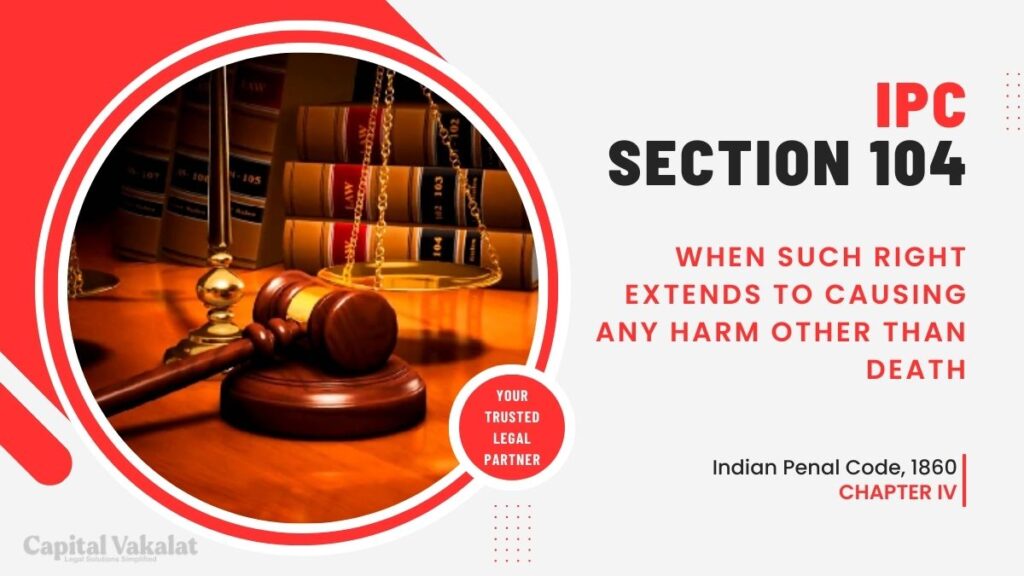In the intricate realm of Indian Penal Code (IPC), Section 104 stands as a significant provision that deals with the extent of the right to cause harm. This legal article will delve into Section 104 IPC, shedding light on its nuances, interpretations, and implications. We will explore when such a right extends to causing harm other than death, dissecting the legal framework and its practical applications.

Section 104 of the Indian Penal Code (IPC) is a legal provision that addresses the right to cause harm in certain situations. It is crucial to understand the circumstances under which this right extends to causing harm other than death.
Section 104 IPC: A Glimpse
Section 104 of the IPC primarily deals with the right to defend oneself or one’s property. It allows individuals to use force when faced with a threat or an attempt to commit a crime against them.
The Right to Self-defense
Under Section 104 IPC, individuals have the right to protect themselves from harm. This includes the use of force when necessary to ward off potential danger.
When Does Harm Extend Beyond Death?
Section 104 IPC becomes particularly relevant when the harm caused goes beyond mere injury and touches upon the potential for death. It is essential to assess the gravity of the situation before invoking this provision.
Defending One’s Property
Not only does Section 104 protect individuals from personal harm, but it also extends to the defense of one’s property. This means that if someone attempts to damage or steal your property, you have the right to use force to prevent it.
Proportional Force
While Section 104 grants the right to cause harm in self-defense or property defense, it emphasizes the use of proportional force. This means that the level of force used should be reasonable and directly related to the threat.
The Role of Intent
Intent plays a crucial role in invoking Section 104 IPC. The individual using force must have a genuine belief that there is an imminent threat to life or property.
Legal Precedents
Several legal cases have set precedents for the application of Section 104 IPC. These cases provide insights into how the provision has been interpreted and applied in different situations.
Section 104 IPC and Domestic Disputes
The application of Section 104 IPC in domestic disputes has raised questions about its misuse. It is essential to understand the boundaries of self-defense within a domestic context.
Reporting the Use of Force
When an individual uses force under Section 104 IPC, it is crucial to report the incident to the appropriate authorities. Failure to do so can lead to legal complications.
Self-defense and the Burden of Proof
In cases where Section 104 IPC is invoked, the burden of proof lies with the individual using force. They must demonstrate that their actions were justified and in accordance with the law.
Misuse of Section 104 IPC
The misuse of Section 104 IPC can have serious consequences. Individuals must be cautious not to misinterpret or abuse this legal provision.
Implications and Consequences
Understanding the implications and consequences of invoking Section 104 IPC is essential for individuals who may find themselves in situations requiring self-defense.
Conclusion
In conclusion, Section 104 IPC grants individuals the right to cause harm in self-defense or property defense, but it must be exercised with caution and within the bounds of the law. It is a provision that balances the right to protect oneself and one’s property with the need for proportional force.
Section 104 IPC serves as a critical provision in Indian criminal law, allowing individuals to defend themselves and their property when faced with threats. However, this right must be exercised judiciously, with a clear understanding of the law’s boundaries and the requirement of proportional force. It is essential to be aware of the legal precedents and potential consequences associated with invoking Section 104 IPC, ensuring that justice is served while preserving individual rights and safety.
FAQs
When can Section 104 IPC be invoked?
Section 104 IPC can be invoked when there is an imminent threat to life or property.
Is proportional force required under Section 104 IPC?
Yes, Section 104 emphasizes the use of proportional force in self-defense.
Are there legal precedents for Section 104 IPC?
Yes, several legal cases have established precedents for the application of Section 104 IPC.
What should one do after using force under Section 104 IPC?
It is essential to report the incident to the appropriate authorities to avoid legal complications.